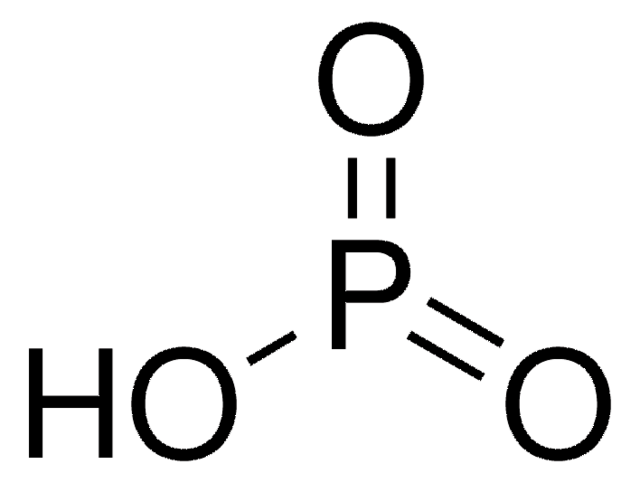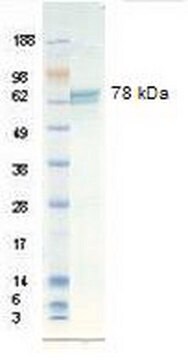239275
meta-Phosphoric acid
ACS reagent, chips, 33.5-36.5%
Synonyme(s) :
Metaphosphoric acid
About This Item
Produits recommandés
Qualité
ACS reagent
Niveau de qualité
Forme
chips
Contient
57.0-63.0% sodium phosphite as stabilizer
Concentration
33.5-36.5%
Densité
2 g/cm3
Traces d'anions
MnO4- reducers: ≤0.02%
chloride (Cl-): ≤0.001%
nitrate (NO3-): ≤0.001%
sulfate (SO42-): ≤0.005%
Traces de cations
As: ≤1 ppm
Fe: ≤0.005%
heavy metals: ≤0.005% (by ICP)
Chaîne SMILES
OP(=O)=O
InChI
1S/HO3P/c1-4(2)3/h(H,1,2,3)
Clé InChI
UEZVMMHDMIWARA-UHFFFAOYSA-N
Vous recherchez des produits similaires ? Visite Guide de comparaison des produits
Description générale
Application
- A catalyst in combination with InCl3 to synthesize 1,8-dioxooctahydroxanthene derivatives by the reaction of cyclic β-diketones and aldehydes.
- A phosphate precursor to synthesize antimony phosphate (SbPO4) by reacting with antimony metal at high temperatures.
Mention d'avertissement
Danger
Mentions de danger
Classification des risques
Eye Dam. 1 - Skin Corr. 1
Code de la classe de stockage
8B - Non-combustible corrosive hazardous materials
Classe de danger pour l'eau (WGK)
WGK 3
Point d'éclair (°F)
Not applicable
Point d'éclair (°C)
Not applicable
Certificats d'analyse (COA)
Recherchez un Certificats d'analyse (COA) en saisissant le numéro de lot du produit. Les numéros de lot figurent sur l'étiquette du produit après les mots "Lot" ou "Batch".
Déjà en possession de ce produit ?
Retrouvez la documentation relative aux produits que vous avez récemment achetés dans la Bibliothèque de documents.
Les clients ont également consulté
Notre équipe de scientifiques dispose d'une expérience dans tous les secteurs de la recherche, notamment en sciences de la vie, science des matériaux, synthèse chimique, chromatographie, analyse et dans de nombreux autres domaines..
Contacter notre Service technique








